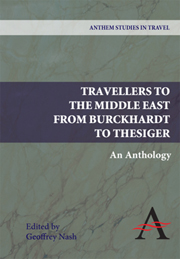Book contents
- Frontmatter
- Contents
- Acknowledgements
- Introduction
- PART ONE THE COMING OF EMPIRE 1800–1879
- PART TWO COLONIALISM AND RESISTANCE 1880–1950
- Ottoman and Former Ottoman Territories
- 1 A Wandering Scholar in the Levant
- 2 Dar-ul-Islam
- 3 Turkey in Revolution
- 4 An Englishwoman in a Turkish Harem
- 5 Three Deserts
- 6 Letters from Palestine, 1932–1936
- Arabia
- Persia/Iran
- Bibliography
3 - Turkey in Revolution
from Ottoman and Former Ottoman Territories
Published online by Cambridge University Press: 05 March 2012
- Frontmatter
- Contents
- Acknowledgements
- Introduction
- PART ONE THE COMING OF EMPIRE 1800–1879
- PART TWO COLONIALISM AND RESISTANCE 1880–1950
- Ottoman and Former Ottoman Territories
- 1 A Wandering Scholar in the Levant
- 2 Dar-ul-Islam
- 3 Turkey in Revolution
- 4 An Englishwoman in a Turkish Harem
- 5 Three Deserts
- 6 Letters from Palestine, 1932–1936
- Arabia
- Persia/Iran
- Bibliography
Summary
Charles Buxton came from a family that had acquired wealth in the brewing industry and after an illustrious career at Cambridge where he took a first in Classics was called to the bar. Liberal in politics, with a strong social conscience, in 1902 Charles became Principal of Morley College, an institute for workingmen and women in South London. The DNB comments: ‘Christian principles informed Buxton's politics and all aspects of his life.’ Together with his older brother, Noel, he helped form the Balkan Committee, a pressure group which promoted the cause of the Balkan Christian nationalities. Although he claimed the Committee had the ‘sole objective of improving the condition of the European subjects of Turkey, Moslem and Christian alike’ it was generally critical of Ottoman governments. Following the Young Turk revolution, Buxton went to Istanbul as an invited observer to be present at the opening of the new parliament. Turkey in Revolution captures the optimism of the early period of Young Turk rule, before the British political establishment became severely critical of the Committee of Union and Progress. The Balkan Committee actively sided with the Balkan nations in the wars that followed, the Buxton brothers journeying to Bulgaria in 1914 presumably to report further Turkish ‘atrocities’.
From:
Turkey in Revolution (1909)
Buxton's account of the opening of the first parliament in Istanbul since Abdul Hamid annulled the constitution thirty years previously focuses on the Sultan, ‘for all his pomp [parliament's] prisoner and…puppet’.
- Type
- Chapter
- Information
- Travellers to the Middle EastAn Anthology, pp. 155 - 159Publisher: Anthem PressPrint publication year: 2009
- 1
- Cited by



